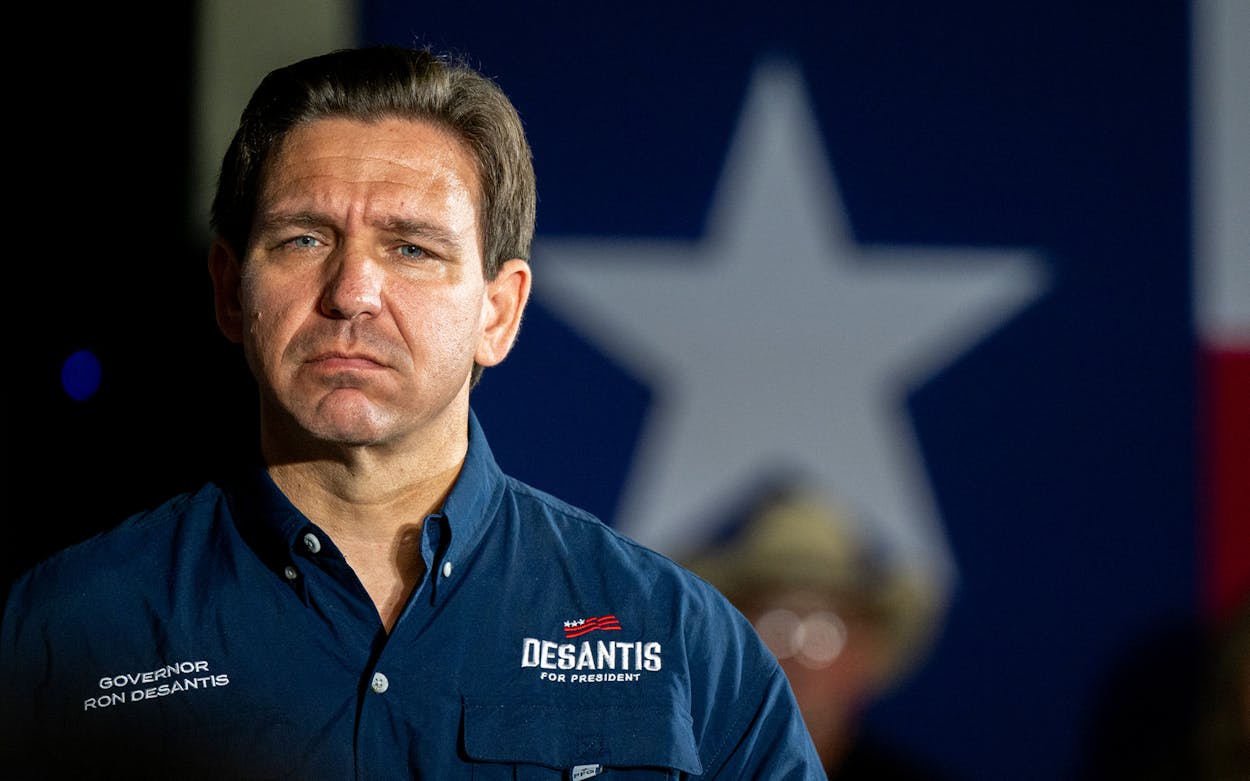On an early March evening when many Houstonians were otherwise occupied with the annual rodeo, Florida governor Ron DeSantis, boy wonder of the Sunshine State but not yet a presidential candidate, took the stage at the annual Harris County GOP Lincoln Reagan Dinner. As he revved up the crowd at the George R. Brown Convention Center during his keynote remarks, he argued that Texas and Florida stood linked at the crux of the nation’s hyperpartisan political and cultural wars. “They know you don’t mess with Texas—and you don’t tread on Florida,” DeSantis said. If not for the two states—red fire walls that tamp down progressive politics—he added, “our entire country would be one big woke, neo-Marxist dumpster fire.”
DeSantis’s speech was full of hope. But Texas and Florida are not the brothers in arms that the Floridian so desperately wants—perhaps even needs—them to be. In fact, since DeSantis entered the presidential race in May, his standing in Texas has been middling. There aren’t yet many polls of the 2024 race here, but the most recent projections show that likely voters in the state’s Republican primary overwhelmingly prefer former president Donald Trump, often by at least twenty points. While most state officials have stayed above the fray, many of those who have made endorsements in the race are similarly pro-Trump. Just one member of Texas’s congressional delegation, Chip Roy, a right-wing Republican who represents a Central Texas district in the U.S. House, has endorsed DeSantis’s candidacy, compared with more than a dozen who’ve backed the former president.
It wasn’t always destined to be this way. At the time of his tour of Texas—in addition to Houston, he held a rally in Dallas—DeSantis seemed to be setting the Texas Legislature’s agenda, with lawmakers in the Lone Star State rushing to pass legislation modeled after bills passed in Florida. DeSantis also checked the box of the elusive “fresh face” that a plurality of national GOP voters repeatedly told pollsters they wanted in a presidential candidate.
Both nationally and in Texas, the Florida governor still polls second, well ahead of two Texan—albeit late—entrants to the race: former congressman Will Hurd and Dallas-area businessman Ryan Binkley. But DeSantis shows no sign of dethroning Trump, who continues to demonstrate an uncanny ability to bend Republicans to his will. No matter that Trump’s been charged with obstruction crimes or that he’s just lost a defamation case, or that it appears he might be charged with crimes related to the riots at the Capitol on January 6, 2020. Texas’s elected Republicans—as they’ve displayed time and time and time again—have shown an unwavering fealty to the former president. Part of it is politics as usual. No one with a reputation to safeguard wants to go on record this early resisting the man who might well be their next president. Past lawmakers who’ve done so have faced consequences at the ballot box. (See: Liz Cheney, Peter Meijer, and Tom Rice—none of whom are still in Congress).
Many in the party’s rank and file also seem to prefer Trump’s style of politics to DeSantis’s. “There is a feeling that Trump has not been treated fairly by the media, but Trump is a fighter,” Cindy Siegel, the Harris County GOP chair, said. “They’re very different men. Trump is a very brash New Yorker, and I’ve always said that he’s one of those guys where if you punch him, he’s going to punch back. And the media learned that. Now, DeSantis, he’s much more—what’s the word?—temperate in his approach.”
Republican voters say they are in the market for a candidate who will quickly start swinging at what they perceive as their shared enemies. “Texas Republicans want somebody who’s very strong. Someone who will shut down the border immediately. Someone who will stop this aggression around the world with China and North Korea,” Jennifer Stoddard Hajdu, the Dallas County Republican Party chair, told me.
Indeed, just because voters nationally might not want a rerun of the 2020 election, that’s not necessarily true of Texans. Jason Villalba, the chairman and CEO of the Texas Hispanic Policy Foundation, a nonpartisan nonprofit, said that grassroots voters here tend to be driven to the polls by a cult of personality. “And that’s Trump,” he said. “I don’t think that’s an indictment on [DeSantis’s] stances, but it shows an inability to translate his policy effectiveness into political strength.”
That doesn’t mean DeSantis, whose primary isn’t for another eight months, is necessarily doomed to lose the state, or that he’s an ineffective candidate (though he’s certainly had a rocky start since announcing his presidential campaign in a glitchy Twitter Spaces appearance with Elon Musk). It just means that, right now, Trump looks like a much better one, in the estimations of Texas’s party leaders and voters alike. While there are a few existing reasons Republicans might find to buck the de facto leader of the GOP, they haven’t abandoned Trump en masse yet. Why start now?
- More About:
- Politics & Policy
- Donald Trump








